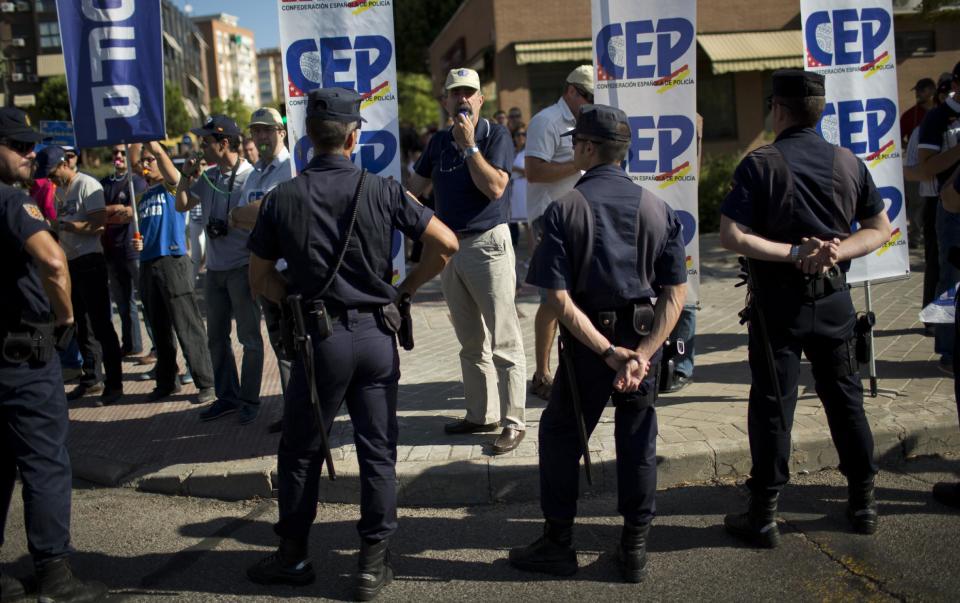Spain's royals take pay cuts in austerity drive
MADRID (AP) — Spain's king and crown prince are taking pay cuts as part of the latest round of austerity measures meted out by the country's government as it attempts to control its deficit during a recession, the Royal Palace said Tuesday.
The salaries of King Juan Carlos and Crown Prince Felipe will be reduced about 7 percent — to about €272,000 ($334,000) and €131,000 ($160,000) respectively — in line with the new austerity package, the Royal Palace said.
The royal family itself has about €8.3 million budgeted for it this year, down 2 percent from 2011. Queen Sofia and Princess Letizia, Felipe's wife, don't get salaries but saw their expenses cut. Palace officials did not provide details, and the royal family budget cuts came a year after 2011 reductions of 5 percent overall with palace employees including the king seeing their salaries cut up to 15 percent.
Spain is enacting more austerity measures in an attempt to convince skeptical investors it has a strategy to deal with its public finances and its banks, which are being bailed out with up to €100 billion from the other 16 countries that use the euro. The measures include government worker pay cuts, higher taxes and labor reforms making it cheaper to fire employees.
The king and prince acted voluntarily this year in cutting their salaries, the Royal Palace said. The announcement came as the Spanish royal family's public profile has taken a battering over the past year, and just as Spain's economy entered its second recession in three years and unemployment rose to nearly 25 percent, the highest in the eurozone.
Recent Spanish royal embarrassments include a national uproar when news leaked out that the king went on an expensive elephant-hunting safari to Botswana in April, and while his son-in-law's financial dealings are under investigation.
Europe's financial crisis has also hit the royal family budgets of Britain, Belgium and the Netherlands, known along with Spain's royals for their palaces, estates and often ostentatious tastes.
Before Tuesday's announcement in Spain, Belgium's King Albert II said in January that he would use part of his salary to help pay for the upkeep on his properties. In the Netherlands, much of last year's savings was in cutbacks to the royals' private travel expenses, and the queen paid for maintenance on her private yacht.
The pay cut for Spain's king and crown prince came as rallies against the Spanish government's austerity have started to become daily affairs in Madrid and across Spain, though the king hasn't been targeted by protesters.
Spanish workers are directing most of their anger at the administration of Prime Minister Mariano Rajoy, and civil servants whose salaries are being cut blocked major avenues again Tuesday. Riot police cordoned off the entrance to a sprawling police facility to prevent 100 plainclothes police officers from disrupting a graduation ceremony for some 1,200 cadets about to enter the force.
The demonstrators were protesting the elimination of one of the 14 paychecks that most Spanish civil servants get each year. The one being axed comes right before Christmas.
As National Police chief Ignacio Cosido addressed the graduating class and highlighted their task of "guaranteeing harmony, social peace and respect for all citizens' rights", police demonstrators in plainclothes a few hundred meters away all but drowned him out by blowing plastic horns. Demonstrators yelled out, calling him "a scoundrel."
The starting salary of a National Police officer is about €1,400 a month, which is slightly above average in Spain. Lorenzo Nebrera, a police union spokesman, said officers get their uniform and service weapon but have to pay for the rest of the equipment, like bullet-proof vests, "handcuffs that work" and flashlights.
"In the end, all these cuts sap morale among the police because they feel that conditions out on the street are more and more dangerous, and if these cuts continue the safety of the police will be jeopardized," Nebrera said. "It is an added risk for a job that is already dangerous."
Nationwide protest rallies against the austerity measures are scheduled for Thursday.
Spain on Tuesday also tapped bond market investors for €3.6 billion ($4.4 billion) in the first debt auction since unveiling its latest package of cuts. Its ability to raise the short-term money at lower interest rates represented a rare bit of good news for the conservative government, which is facing mounting opposition to its austerity plans.
The Treasury sold €2.6 billion in 12-month bills at an average interest rate of 3.9 percent, down from 5.07 percent in the last such auction on June 19. It also sold €961 million in 18-month bills at a rate of 4.24 percent, which was down from the previous rate of 5.10 percent.
Demand exceeded supply by more than two and nearly four times, respectively.
Spain's main IBEX stock index rose about a half a percentage point following the successful auctions. However the country's borrowing on its benchmark 10-year bond ended the day at 6.78 percent — dangerously close to the 7 percent level that saw Greece, Ireland and Portugal apply for full-blown bailouts.
But Economy Minister Luis de Guindos seized as the auction as good albeit not earthshattering news. "I think it has been relatively positive. This shows that Spain still has access to markets," he told reporters.
Finance Minister Cristobal Montoro said Tuesday that civil servants on monthly salaries of €962 or less would receive the extra payment. The exemption will benefit some 15,000 of Spain's near 3 million civil servants, he said.
He said he recognized the measures "involved asking Spaniards to make a greater effort at a critical time but that this effort was worth making to end the crisis sooner."
___
Ciaran Giles and Iain Sullivan contributed to this report.



